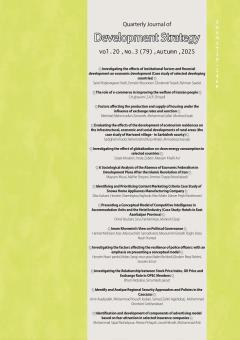Imam Khomeini's View on Political Governance
Subject Areas :
Hamed Mohseni azar
1
,
Manuchehr Samadivand
2
,
Masomeh Gharadaghi
3
![]() ,
reza nasiri hamed
4
,
reza nasiri hamed
4
![]()
1 - Department of Political Science and International Relations, Tabriz Branch, Islamic Azad University, Tabriz, Iran
2 - Department of History, Tabriz branch, Islamic Azad University, Tabriz, Iran (corresponding author)
3 - Department of History, Shabestar Branch, Islamic Azad University, Shabestar, Iran (corresponding author)
4 -
Keywords: Keywords: Imam Khomeini (RA), Wilayat-e Faqih, Political Government, Republic, Party.,
Abstract :
Hamed Mohseni Azar Manouchehr Samadivand Masoumeh Ghareh Daghi Reza Nasiri Hamed Abstract Imam Khomeini (RA) introduces the necessity of establishing an Islamic government as the implementation of Sharia and religious laws, believing that after the Prophet (PBUH), divine governance belonged to the Infallibles (AS), and during the occultation, the Islamic government should be under the supervision of a jurist on behalf of the Infallible Imam (AS). In Imam Khomeini's (RA) political thought, the ideal political system and government is the Islamic government. The Islamic government is not any of the existing types of government; for example, it is not despotic where the head of state is tyrannical and arbitrary. The Islamic government is neither despotic nor absolute, but constitutional. However, not in the current conventional sense where the enactment of laws depends on the opinions and majority of individuals. It is constitutional in these sense that the rulers are bound in implementation and administration to a set of conditions specified in the Holy Quran and the Sunnah of the Prophet (PBUH). The set of conditions refers to the Islamic laws and regulations that must be observed and implemented. Therefore, an Islamic government is a government of God's law over the people. During the occultation of the Infallible Imams, an Islamic government can be formed and administered by the Supreme Jurisprudent (Wilayat-e Faqih). An Islamic government is necessary for the implementation of Islamic Sharia. Imam Khomeini (RA) was able to revive the intellectual tradition of Islamic government, to which he belonged and which had declined after the execution of Sheikh Fazlullah, by resorting to the concepts of democratic tradition, Shiite constitutionalist views, and even some views of the leftist intellectual tradition, while preserving its core intellectual elements.
